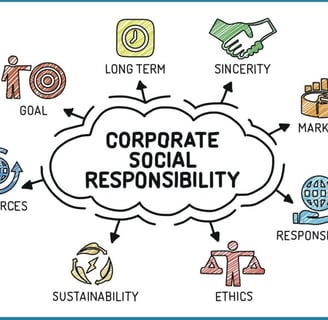Corporate Social Responsibility: Legal Framework And Practical Impact
In the modern business world, success is no longer measured solely by profit margins. Companies today are expected to contribute positively to the communities and environments in which they operate. This evolving expectation has placed Corporate Social Responsibility (CSR) at the heart of responsible corporate behavior.
Milasha Biju, 3rd year, BBA., LL.B (hons.)
4/29/20251 min read


Understanding CSR in a Contemporary Context
CSR refers to a company’s ethical duty to give back to society through initiatives that promote social welfare, environmental protection, and inclusive development. Rather than being an afterthought, CSR has become a critical pillar of sustainable business strategy.
It goes beyond donations or charity—it includes responsible supply chains, eco-friendly operations, community development, and employee well-being.
India’s Legal Framework: A Global First
India became the first country to mandate CSR through legislation. The Companies Act, 2013 introduced Section 135, which requires certain companies to invest in social development.
Firms that meet at least one of the following criteria:
Net worth of ₹500 crore or more
Turnover of ₹1,000 crore or more
Net profit of ₹5 crore or more
must spend 2% of their average net profit (over the last three financial years) on approved CSR activities.
These activities are defined in Schedule VII of the Act, which includes promoting education, eradicating hunger, supporting healthcare, ensuring environmental sustainability, and more.
Additionally, companies must form a CSR Committee and disclose their initiatives and expenditures in their annual reports.
CSR in Action: Real-World Impact
Since the mandate, many Indian companies have taken up CSR with renewed commitment. Large-scale projects have improved access to education, healthcare, clean water, and vocational training—especially in rural and underdeveloped areas.
CSR initiatives have also enhanced company credibility, built stronger community relations, and helped in brand differentiation in a competitive market.
Challenges in Implementation
While the legal framework has driven positive change, several challenges persist:
Some companies prioritize compliance over real impact
Monitoring and evaluation of CSR outcomes remain weak
Lack of transparency and credible implementation partners can hinder success
True impact lies not just in spending, but in strategic, long-term engagement with communities.
Conclusion
CSR is not just about meeting a legal requirement—it’s about creating lasting value for society and the business itself. The Indian legal framework has laid a solid foundation, but it is up to companies to approach CSR with integrity and purpose.
By aligning profit with responsibility, businesses can help build a more equitable and sustainable future.
Because Every Legal Mind Deserves a Great Conversation.
Legaltea.in@gmail.com
+91 6284295492
MSME Certified
© 2025 Legal Tea. All rights reserved.


